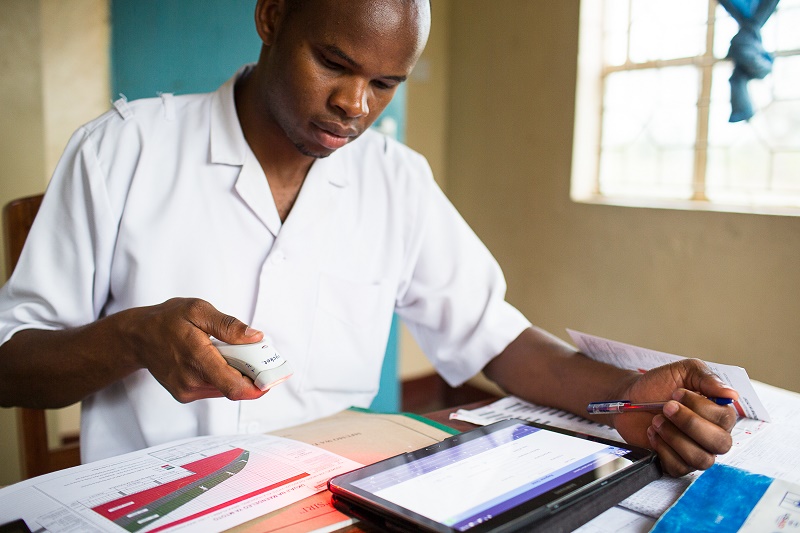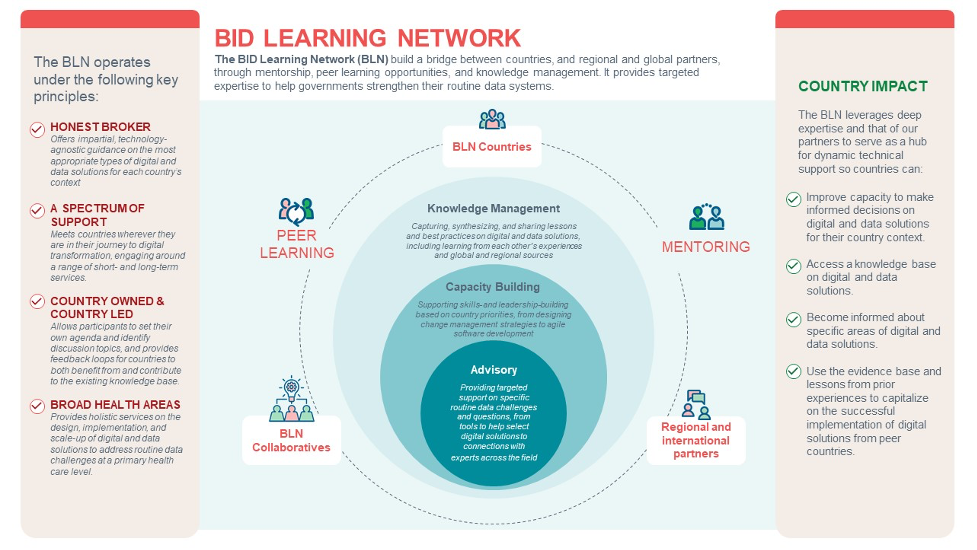BID Learning Network
The BID Learning Network (BLN) was established in 2014 as part of the BID Initiative to bring together digital health experts and immunization program managers from across sub-Saharan Africa to exchange experiences in implementing electronic immunization registries, data management systems, change management approaches, and data use policies and practices. The BLN provides a set of holistic services that leverage our deep expertise, and that of our partners, on the design, implementation, and scale-up of digital and data solutions to address routine data challenges at a primary health care level, while providing a hub for professional peer learning.
Under the BLN, participants are part of a community that connects, learns, and collaborates across borders and health areas while accessing a series of more targeted services and mentorship. These range from peer-learning exchanges to system demonstrations and rich dialogues about the challenges and lessons of introducing digital and data solutions. We have created hubs for experimentation and capacity strengthening among professionals and country leaders. Members can benefit from targeted services such as:
- Advisory: Targeted support to countries seeking guidance on specific routine data challenges and questions, including providing them with tools to help select an appropriate digital solution, system demos, and connections to experts across the field.
- Capacity building: Support for country participants to build their skills and leadership around a range of areas they have prioritized. Mentors partner with governments based on their priorities, to build country capacity on the appropriate phases of design, introduction, adoption, scale-up, and sustainability of digital and data solutions.
- Knowledge management: Capturing, synthesizing, and sharing lessons and best practices with countries on digital and data solutions, including learning from each other’s experiences as well as from regional and global sources. Countries participate in meetings, webinars, and learning exchanges with the BLN, allowing government leaders and digital health experts to collectively tackle some of the most complex challenges facing health information systems.
The BLN functions as an honest broker to countries and ministries of health whether they require short-term, one-off, or deeper, long-term support. Would you like to be a member of the BLN? Get in touch.
A case study from The Gambia
The Gambia has achieved high immunization coverage over the last 15 years. But recently there have been modest declines in national coverage from 97 percent in 2013 to 92 percent in 2017. To close the gap, The Gambia became interested in digitalizing the country’s immunization data collection system. As one of the earliest members of the BLN, it turned to the peer learning network for an opportunity to connect, experiment, and learn from other countries pursuing similar digital platforms.
In addition to receiving a small grant from the BLN to pilot an electronic immunization registry called the E-Tracker, The Gambia benefited from a chance to peer pair with other countries at varying stages in their digital journeys, allowing them a foundation of best practices to learn from. Mbye Njie, the Expanded Program for Immunization (EPI) manager for The Gambia, explained, “The benefits of participating [in the BLN] are enormous. There are many opportunities as the members are willing to support each other and share experiences.”
The BLN’s participatory approach to problem-solving has inspired a similar model in-country. In The Gambia, the EPI helped to replicate principles of peer learning at a local level to introduce new ideas and expertise within the country. The Gambia now has a data quality team that includes different stakeholders working together to address data-related immunization challenges.


